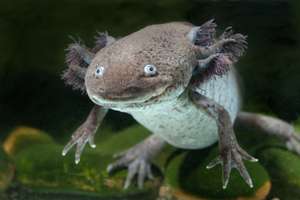The salamander king

When assis¬≠tant pro¬≠fessor of biology James Mon¬≠aghan was an under¬≠grad¬≠uate, he hung a life-‚Äč‚Äčsize inflat¬≠able Spi¬≠derman from the ceiling of his dorm room. The plastic incar¬≠na¬≠tion of the super¬≠hero fol¬≠lowed him all the way to his new lab here at North¬≠eastern. His obses¬≠sion with the "genius kid-‚Äč‚Äčscientist" earned Mon¬≠aghan the nick¬≠name "Spi¬≠derman," and it stuck until grad¬≠uate school, where he found a new obses¬≠sion: salamanders.
Like the Lizard, the vil¬≠lain in the most recent Spi¬≠derman movie, Mon¬≠aghan is a biol¬≠o¬≠gist inter¬≠ested in spinal cord and limb regen¬≠er¬≠a¬≠tion, for which sala¬≠man¬≠ders have become known. In par¬≠tic¬≠ular, Monaghan's research cen¬≠ters on the axolotl (AK'‚Äďsuh‚Äďlot-‚Äč‚Äčl) sala¬≠mander, which can regrow an arm, foot, or even parts of its brain in near-‚Äč‚Äčperfect fashion.
Mon­aghan ana­lyzes the genomes of axolotls in an attempt to iden­tify fac­tors that are required for regen­er­a­tion. If the same genes are present in humans but are simply not turned on during wound healing, he posits, then it is plau­sible to con­sider a future in which human limb regen­er­a­tion is feasible.
While doing research as a post¬≠doc¬≠toral stu¬≠dent at the Uni¬≠ver¬≠sity of Florida, Mon¬≠aghan and his col¬≠leagues pub¬≠lished a one-‚Äč‚Äčof-‚Äč‚Äča-‚Äč‚Äčkind paper in which they pre¬≠sented a genet¬≠i¬≠cally engi¬≠neered sala¬≠mander that glows green when its retinoic acid pathway is active. Retinoic acid is a sig¬≠naling mol¬≠e¬≠cule that seems to be impor¬≠tant for regen¬≠er¬≠a¬≠tion. By allowing labs to see retinoic acid activity, Monaghan's team cre¬≠ated an impor¬≠tant tool for the field.
Mon­aghan intends to con­tinue devel­oping sim­ilar tools in his research lab at North­eastern. "The next step is to gen­erate ani­mals that can express reporters and genes in spe­cific tis­sues at spe­cific times," he said.
The ques­tion of limb regen­er­a­tion has puz­zled sci­en­tists as far back as Aris­totle. In 1768, one of the fathers of exper­i­mental biology, Laz­zaro Spal­lan­zani, won­dered why other ani­mals "are not endued with the same power" as sala­man­ders. "Is it to be hoped they may acquire them by some useful dis­po­si­tion?" he asked. "Should the flat­tering expec­ta­tion of obtaining this advan­tage for our­selves be con­sid­ered entirely as chimerical?"
"[The quo­ta­tion is] a great example of how many ques­tions we ask in biology are not new, such as how ani­mals develop or regen­erate," said Mon­aghan, who sus­pects that the renais­sance of regen­er­a­tive biology in pop­ular cul­ture reflects the mat­u­ra­tion of the field. "The exciting part is that we just now have the tools to prop­erly address them."
Provided by Northeastern University


















